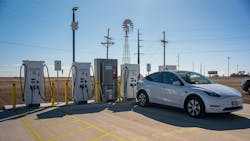New Resource Outlines Solutions to Accelerate EV Charging Energization
Idaho National Laboratory and Pacific Northwest National Laboratory have published a new report with solutions to accelerate timelines for EV charging load service requests across the country. The report incorporates expertise from the Joint Office of Energy and Transportation, Office of Electricity, and Vehicle Technologies Office to propose ways to accelerate progress on EV charging infrastructure buildout for NEVI, CFI, and other EV charging programs.
The solutions noted in this white paper require collaborative efforts among utilities, regulators, and EV charging infrastructure developers to streamline the grid connection process for EV charging infrastructure and are broadly organized into four areas, described below:
- Increase data access and transparency: Develop automated load service request tools, integrate hosting capacity and load service request analyses, incorporate EV adoption forecasts and provide transparency on the processing queue.
- Improve energization processes and timing: Create fast-track options based on pre-screening criteria, provide flexibility or phased approvals in the load service request/interconnection process, build internal knowledge within utilities about EV charging technologies, and provide standardized workforce training.
- Promote economic efficiency: Right-size distribution components to accurately reflect the load requirements of EV charging infrastructure, make proactive investments in grid infrastructure based on EV adoption forecasts and growth projections, and consider energy equity and environmental justice factors such as access to equitable EV charging when planning infrastructure.
- Improve grid reliability and resilience: Use load management/power control systems (PCS) at EV charging stations, adopt and implement harmonized standards for communication protocols and information models between the EV charging and grid control infrastructure, and address cybersecurity considerations by implementing robust security measures and standards for EV charging infrastructure – with particular emphasis on clarifying the security requirements for the interface to the grid.
The whitepaper solutions aim to accelerate the timeline and decrease costs associated with connecting EV charging infrastructure to the grid. Electric utilities, utility regulators, EV charging infrastructure developers and site hosts will first need to understand which solutions are available in their service territory, and if warranted which combination of solutions would support their specific needs. Through the successful implementations of solutions detailed in this paper, industry is demonstrating a new and innovative ecosystem where timely deployment and energization of EV charging infrastructure with greater grid resiliency and reliability is a reality.
For more information, read the full whitepaper.
